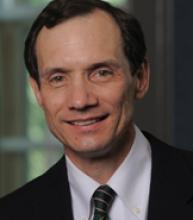Michael J. Lenardo facts for kids
Dr. Michael J. Lenardo is a leading scientist at the National Institute of Allergy and Infectious Disease (NIAID), which is part of the National Institutes of Health (NIH). He is the head of a special section that studies how our bodies develop and how our immune system works. He also helped start a program that uses genetics to understand and treat diseases.
Dr. Lenardo is trained in genetics, molecular biology, and immunology. His research focuses on how the cells in our immune system fight off different germs, like viruses and bacteria. He has studied genetic problems in the immune system, how cells die, and genetic diseases that affect how our immune system stays balanced. He also works on finding new ways to diagnose and treat these diseases.
His important discoveries have shown how studying our genes can lead to personalized treatments for human diseases. In 2006, Queen Elizabeth II gave him a special award called the Officer of the Most Excellent Order of the British Empire (O.B.E.). In 2019, he was chosen to be a member of the National Academies of Sciences and the National Academy of Medicine. These are considered some of the highest honors for scientists and medical researchers in the U.S.
Quick facts for kids
Dr. Michael J. Lenardo, M.D.
|
|
|---|---|
 |
|
| Personal details | |
| Born | December 1, 1955 Chicago, Illinois, U.S. |
| Nationality | American |
| Education | Johns Hopkins University (BA) Washington University School of Medicine (MD) |
| Awards | Irish Society of Immunology Award American Association of Immunologists Steinman Award for Human Immunology Research |
| Scientific career | |
| Fields | Molecular immunology Molecular genetics |
| Institutions |
|
Contents
Early Life and Education
Michael J. Lenardo was born in Chicago, Illinois, on December 1, 1955. His father was a doctor. Michael became interested in genetics when he was in high school. For a project, he made pictures of chromosomes for a hospital that was studying problems in babies.
He continued his research in molecular genetics (the study of genes at a tiny level) at Johns Hopkins University in Baltimore, Maryland. He worked in a lab at the medical school and graduated in 1977. He then went to Washington University in St. Louis, where he learned about molecular biology by studying viruses. He earned his medical degree (M.D.) in 1981. After graduating, he married Dr. Lesley-Anne Furlong, who was also a medical student.
Career in Science
After medical school, Dr. Lenardo did an internship in internal medicine. Then, he joined a special program to research cancer at the University of Iowa. He worked in a lab where he learned advanced techniques like how to work with DNA and read its code. This made him want to focus on molecular research instead of just treating patients.
Later, Dr. Lenardo did more advanced training at the Whitehead Institute for Biomedical Research. He studied how genes are controlled in mammals. He worked with famous scientists who had won the Nobel Prize, David Baltimore and Philip Sharp. During this time, he made important discoveries about how our immune system works. After his training, he became an independent researcher at the NIAID, part of the NIH.
Discoveries at the NIH
In 1989, Dr. Lenardo started his own research group at NIAID. He later became a senior investigator and section chief. In 2019, he was named an NIH Distinguished Investigator, which is a very high honor for top scientists at the NIH.
Dr. Lenardo has published over 250 scientific papers and holds several medical patents. His work focuses on understanding human immunodeficiency diseases (when the immune system doesn't work right). He uses many modern techniques to study these conditions.
His research has led to the discovery of new molecules that help keep our cells balanced. These include molecules like Fas, Caspase 8, Caspase 10, and CTLA-4. Because of his wide-ranging approach, his lab has been able to identify the first human genetic diseases linked to each of these molecules. Some of these diseases are Autoimmune Lymphoproliferative Syndrome, Caspase-8 deficiency syndrome, PASLI disease, XMEN disease, CHAI, and LATIAE disease.
Dr. Lenardo's work shows how these molecules control the balance of both immune and non-immune cells. This has helped explain how many immune and genetic diseases start and how they work. It has also led to ideas for successful treatments. For example, in 2017, his lab identified CD55 deficiency (which they named CHAPLE disease). This discovery led to a safe and very effective long-term treatment for a disease that used to be incurable and very serious. His discoveries have also been helpful in understanding common diseases like cancer.
Dr. Lenardo has also helped create several joint research programs. These include the NIH-Oxford-Cambridge Scholars Program (OxCam), which helps young scientists get their PhDs.
Music
Dr. Lenardo is a member of a band called The Affordable Rock ‘n’ Roll Act. The band is made up of doctors, scientists, and researchers from the NIH, including the NIH Director, Francis Collins. Dr. Lenardo sings and plays guitar. The band has performed at places like the Library of Congress. Dr. Lenardo says that music helps him be creative and optimistic, which helps his scientific work on serious diseases.
Awards and Honors
- 2006: Officer of the Most Excellent Order of the British Empire (O.B.E.) from Queen Elizabeth II
- 2009: Fellow, American Association for the Advancement of Science
- 2014: Irish Society of Immunology Award
- 2019: Member, National Academy of Sciences
- 2019: Member, National Academy of Medicine
- 2019: NIH Distinguished Investigator (a top honor at NIH)
- 2020: Fellow, Academy of Medical Sciences of Great Britain
- 2020: American Association of Immunologists Steinman Award for Human Immunology Research
- 2021: Inaugural Fellow, Clinical Immunology Society
See also
- Autoimmune Lymphoproliferative Syndrome
- CHAPLE Disease
- XMEN Disease
- PASLI Disease
- CHAI Disease

